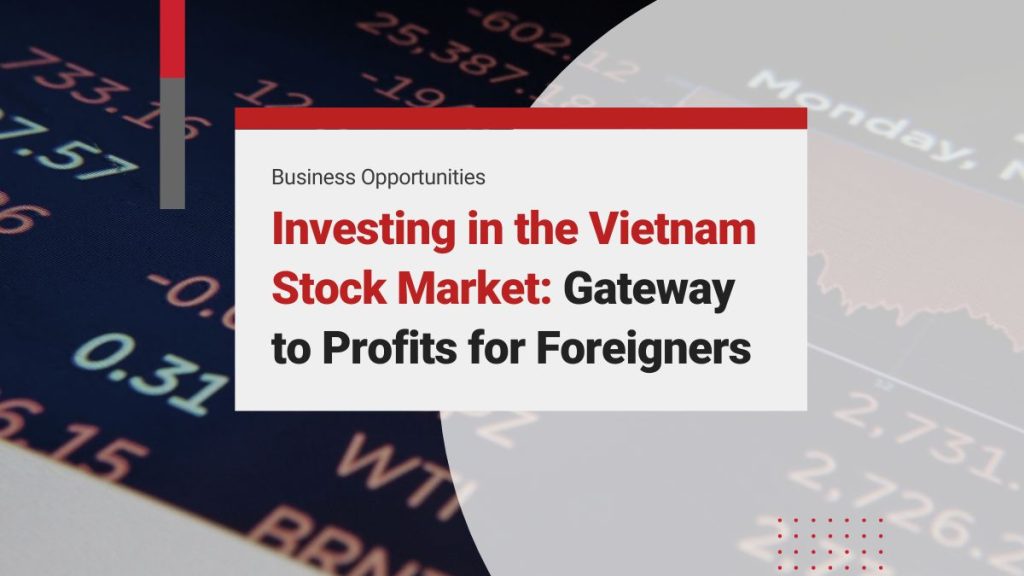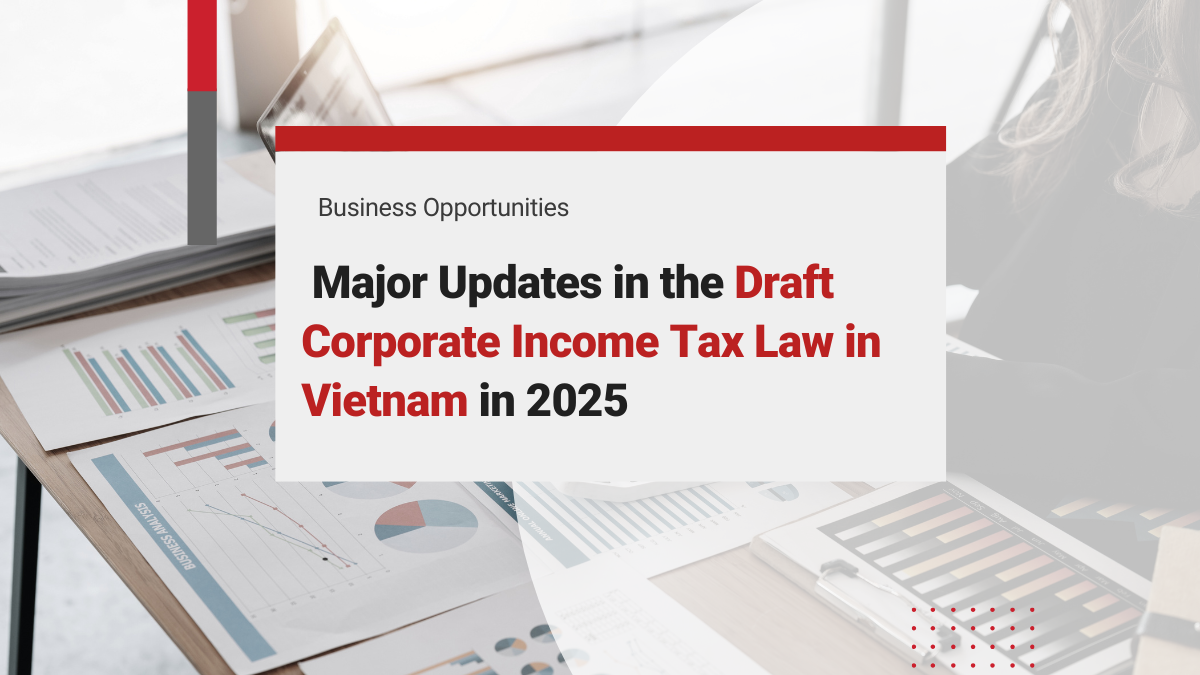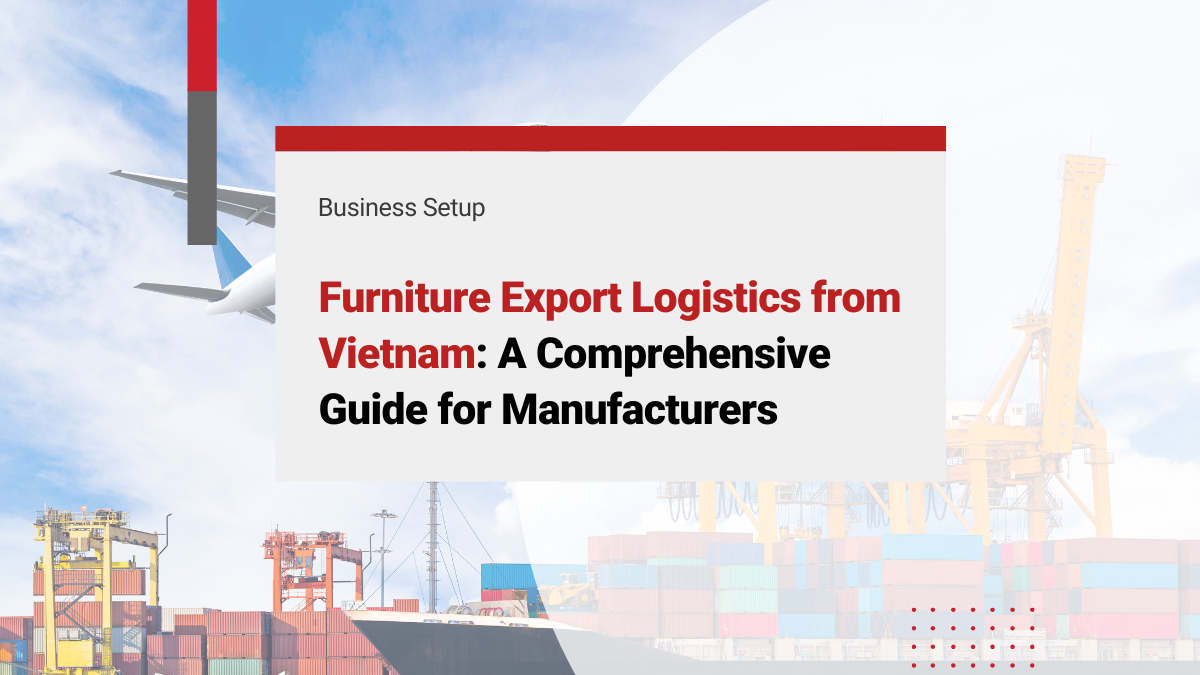Vietnam, an emerging market on the verge of transitioning from a lower-income to a middle-income nation, presents a wealth of attractive opportunities for potential investors, particularly within its dynamic stock market. However, navigating the Vietnam Stock Market without a thorough understanding of its procedural intricacies can expose investors to substantial risks. If your approach includes opening a corporate brokerage or bank account, or building a wider business presence, it’s worth understanding the process of setting up a company in Vietnam early on.
This article aims to provide comprehensive information on the essential steps required to establish a stock market account in Vietnam. By equipping investors with this knowledge, we seek to empower them to make informed and prudent investment decisions, maximizing their potential for success in this promising market.
Potential of Stock Market in Vietnam
The Vietnam stock market has demonstrated remarkable resilience and growth in 2025. By the end of June 2025, the VN-Index reached 1,376.1 points, marking an impressive 8.63% increase compared to the end of 2024. The market achieved a new three-year high in May 2025, when the VN-Index closed at 1,332.6 points, representing an 8.67% gain for the month. Most remarkably, by July 3, 2025, the VN-Index set a new peak for the year at 1,391.78 points, reaching its highest level since March 2022.
Vietnam’s stock market emerged as one of the best-performing markets in Asia during the first half of 2025. The VN-Index rose approximately 8% year-to-date by mid-2025, outperforming many regional counterparts. The market’s total capitalization reached approximately $310 billion by June 2025, equivalent to about 65% of GDP.
Leading securities firms have provided optimistic projections for 2025. VNDIRECT expects the VN-Index to reach 1,400-1,520 points in 2025, with EPS growth of 14-17% for companies listed on HOSE. SHS maintains a target range of 1,400-1,420 points for the VN-Index in 2025. In more bullish scenarios, VCBS forecasts the VN-Index could reach 1,555 points with a P/E ratio of 14.6x, or even 1,663 points in an optimistic scenario where market upgrade expectations are realized.
Investor engagement has reached unprecedented levels in 2025. As of the end of June 2025, Vietnam officially surpassed 10.2 million securities trading accounts, with the country adding nearly 1 million new accounts in the first half of 2025. This milestone represents approximately 10% of Vietnam’s population having securities accounts, far exceeding the government’s original target of 9 million accounts by 2025. By May 2025 alone, over 190,000 new accounts were opened.
Foreign investor interest has shown signs of revival in 2025. After a prolonged period of net selling, foreign investors recorded a net buy of VND 3.5 trillion in May 2025, marking the first month of net buying since January 2024 and the largest net purchase since January 2023. The total number of foreign trading accounts reached 50,204 by June 2025, including 44,021 individual accounts and 6,183 organizational accounts.
Market liquidity has remained robust throughout 2025. In May 2025, the matched order liquidity reached nearly VND 20 trillion (US$767.6 million) per session. The average daily trading value on HoSE reached approximately VND 22.74 trillion per session in March 2025, representing a 27.3% increase from February. For the first quarter of 2025, the average trading value was VND 18.15 trillion per session.
Market valuations remain attractive in 2025. The P/E ratio of the VN-Index stands at approximately 14.1x, near the 3-year average of 14.7x and below the 5-year average of 16.7x. The forward P/E ratio of 11.54x is considered attractive given current growth prospects. Vietnam’s P/E ratio of around 12.8x is comparable to Indonesia and lower than many regional markets including China (13.84x), South Korea (13.29x), India (22x), Thailand (18.11x), and Malaysia (19.48x).
The banking sector has emerged as a key driver of market performance in 2025. Banks achieved a profit after tax of VND 67.1 trillion in Q4 2024, reflecting a significant 27.3% rise year-over-year. The banking sector’s market capitalization exceeded VND 578.1 trillion (US$22.6 billion) by the end of 2024, accounting for 8.1% of total market capitalization. Given expectations of double-digit GDP growth, credit expansion in the banking sector could reach 16-18% in 2025.
Vietnam’s economy has demonstrated exceptional growth momentum in 2025. GDP growth reached 7.52% in the first half of 2025, a 15-year record high. The Q2 2025 growth rate of 7.96% was the second highest in the 2020-2025 period. The government targets GDP growth of at least 8% for 2025, with economic scale projected to exceed US$500 billion.
International organizations continue to provide positive but more cautious projections for Vietnam. The Asian Development Bank forecasts GDP growth of 6.6% in 2025 and 6.5% in 2026. The World Bank projects more conservative growth of 6.8% in 2025 before settling at 6.5% in 2026, while some forecasts suggest growth could moderate to 5.8% due to increased trade policy uncertainty.
Experts suggest that the market has already absorbed many challenges. The market’s current attractive valuations, with P/E ratios at historically low levels, present compelling opportunities for long-term investors. This advantageous position could help Vietnam transition to an emerging market within two years. Recent sustained net foreign buying trends reflect the appeal of these attractive valuations. The most significant development is Vietnam’s strong prospect for stock market upgrade to emerging status. The State Securities Commission expects Vietnam’s stock market to achieve emerging market status by September 2025, with Deputy Finance Minister Nguyen Duc Chi expressing optimism about the upgrade timeline.
How to Invest in Vietnam Stocks via Shares and Funds
Here is a step-by-step guide to registering and investing in the Vietnam stock exchange:
1. Choose a Reliable Stock Broker
To begin your journey into the Vietnamese stock market, you have to select a reputable stock broker. As a newcomer, having a stock broker is crucial as they will offer guidance on high-performing stocks and act as an intermediary, especially for foreign investors. Major and reputable brokerage firms often have English-speaking customer representatives who can provide comprehensive assistance. Visiting their branches in person can enhance your understanding of investing in Vietnam’s stock market.
Opting for larger brokerage firms is advantageous due to their expertise and experience in stock brokering, which is vital for a successful investment journey. Your chosen broker will walk you through the account opening procedures and equip you with essential knowledge so that you can embark on your investment journey. You can also consider the following well-established names:
- Ho Chi Minh City Securities Corporation
- ACB Securities Company Ltd.
- Saigon Securities Incorporation
- Viet Capital Securities Joint Stock Company
- Yuanta
- Vndirect Securities Corporation
Leading brokerage firms by market share in 2025 include VPS Securities (which has maintained the top position for five consecutive years with market shares of 16.94% on HOSE, 19.09% on HNX, 21.22% on UPCOM, and 50.64% in derivatives), SSI Securities, Techcom Securities, VNDIRECT Securities, and MB Securities. The securities industry has shown strong growth, with companies like DNSE Securities targeting 44% net profit growth in 2025.
2. Initiate Your Brokerage Account
Opening a brokerage account is a crucial step because it serves as your hub for trading equities and stocks listed on the stock exchange. It is the platform where you execute your stock-related decisions and monitor the outcomes of each action. The process of opening a brokerage account entails submitting requisite documents to the relevant authorities. These documents will also be necessary for subsequent steps in the investment process. While specific document requirements may vary based on your chosen brokerage company, the following list generally covers the essentials:
- A copy of your passport
- A completed account opening application
- FATCA Compliance Document (For US Citizens)
- Power of Attorney (POA)
- Securities Trading Code Application
3. Establish a Local Bank Account
A pivotal step in the process is to open a bank account within Vietnam. This account holds significant importance as it serves as the repository for your funds within the country. Additionally, it functions as the designated destination for the deposits of your earnings.
Important regulatory updates in 2025 have streamlined the account opening process for foreign investors. The State Bank of Vietnam issued Circular 3/2025/TT-NHNN, which simplifies administrative procedures for foreign investors, particularly in the account opening stage. The new regulation replaces the previous Indirect Investment Capital Account (IICA) with the simpler Indirect Investment Account (IIA) effective from June 16, 2025.
4. Acquire Your Securities Trading Code
An indispensable prerequisite for engaging in stock exchange activities in Vietnam is obtaining a securities trading code. This code functions as the unique identifier for traders and investors within the stock exchange arena.
Your engaged broker can play a pivotal role in guiding you through this obligatory procedure. Their involvement throughout the various steps ensures a smooth and error-free journey.
The issuance of securities trading codes to foreign investors has continued to grow in 2025. In June 2025 alone, 187 foreign investors (18 organizations and 169 individuals) were granted new securities trading codes. For the second quarter of 2025, a total of 572 foreign investors received securities trading codes. As of June 2025, the total number of securities trading codes stands at 50,204 (6,183 organizations and 44,021 individuals).
5. Commence Trading and Make Your Initial Stock Purchase
Finally, the moment you’ve eagerly anticipated has arrived. With your acquired securities trading code and the funds deposited into your brokerage account, you are now primed to embark on your trading journey. The avenues of shares and index funds in the Vietnamese stock market offer viable entry points.
These instruments are often integrated into a buy-and-hold approach and oriented towards securing long-term gains. However, they can also be employed for short-term trading strategies.
The trading experience has been significantly enhanced with the launch of the KRX trading system on May 5, 2025. This advanced platform, developed with support from Korea Exchange and representing an investment of approximately VND 900 billion (US$35.4 million), introduces numerous new features including improved order matching, enhanced odd-lot trading capabilities, and better support for foreign investor transactions.
Shares
Foreign investors interested in venturing into Vietnam’s equity landscape must establish trading accounts with domestic brokerages, affiliated with the HOSE. Additionally, foreign individuals are mandated to open a local bank account and secure a securities trading code, These are prerequisites for commencing trading in Vietnamese stocks.
Moreover, the possibility of considering investment firms that wield substantial exposure to Vietnam’s corporate realm could prove lucrative. Notable examples include entities like the VinaCapital Vietnam Opportunity Fund (VOF) and Vietnam Enterprise Investments (VEIL). Before engaging in any financial commitments, it remains paramount to diligently undertake individualized research into the companies’ fundamentals and management structures.
Significant regulatory improvements have been implemented to facilitate foreign investment in 2025. The Ministry of Finance issued Circular 68/2024/TT-BTC in September 2024, which became effective in November 2024, allowing foreign institutional investors to place securities orders without sufficient funds (removing the pre-funding requirement). This circular is considered a crucial step toward Vietnam’s stock market upgrade to emerging status. Additionally, a draft decree is being prepared to prevent public companies from setting foreign ownership limits lower than legally specified ratios.
Investing in the Vietnam Stock Market? Check out InCorp Vietnam’s Company Registration Services
Vietnam Stock Index Funds
For foreign retail investors aiming to seamlessly access Vietnam’s equity markets, index funds represent an appealing and streamlined avenue. These funds serve as a popular choice, facilitating exposure to the dynamic Vietnamese market landscape.
Numerous passive index-linked investment options, including exchange-traded funds (ETFs) and mutual funds, are at the disposal of investors seeking to mirror the trajectories of key equity indices like the FTSE Vietnam All-Share index and the FTSE Vietnam index. These investment avenues offer a hassle-free approach, obviating concerns surrounding foreign ownership constraints. The composition of these indices is subject to regular quarterly evaluations, ensuring that included stocks meet the requisite eligibility criteria. As a result, investors can confidently partake in these vehicles without being encumbered by ownership limitations.
Steps to Open a Stock Market Account in Vietnam
1. Compile Essential Documentation
For Individual investors:
- A valid passport
- At least four notarized copies of your passport.
For Investment Firms or Institutional Investors:
- 1 registration form for securities trading code, from the Vietnam Securities Depository
- 1 legalized copy of the incorporation certificate in the host nation, together with a notarized translation of the document into Vietnamese
- 1 copy of the Passport of the authorized representative
2. Opening a Vietnamese Bank Account
For Individual Investors:
- Overseas Account Opening
If you reside outside of Vietnam and intend to establish a trading account, communicate with consultants to facilitate the initiation of a bank account in your name.
- Onshore Account Opening
Individual investors situated in Vietnam must first establish a bank account with a custodial bank. This account can subsequently be linked to a stock trading account, allowing for seamless transactions.
Institutional Investor Guidelines:
Institutional investors must establish a custodial bank account, adhering to the following criteria:
- Submission of Certificate of Incorporation
- Presentation of ID/Passport belonging to the authorized representative
- Furnishing any additional forms stipulated by the Custodian Bank
Related Read: Ease of Doing Business in Vietnam: Why Do Foreign Investors Choose This Destination?
3. Acquire Your Exclusive Securities Trading Code – Institutional Investors
For participation in stock trading or any form of securities trading within Vietnam, institutional investors are obligated to possess a Securities Trading Code. The process for obtaining this code has been previously outlined.
4. Launch Your Stock Trading Account
After completing the required documents, the investor needs to take them to the brokerage firm to complete the account opening process. It is also advised that the investor contact a brokerage company first to ensure that they have someone who can advise and assist them in their language throughout the entire process.
Setting up a stock account in Vietnam could be easier with a brokerage company helping out at every turn of the way. However, an investor must understand and make note of some specifics listed in the following section to avoid any procedural pitfall.
Risks of Vietnam Stock Market Account
Liquidity Concerns
While Vietnam’s stock market boasts substantial liquidity, it can vary considerably across different stock tickers. For instance, stocks like HPG (Hoa Phat Group) often trade over a million shares daily, whereas lesser-known stocks like HCT (Hai Phong Cement Transport Service Company) witness lower liquidity. Holding a significant amount of illiquid stock could pose challenges if selling becomes difficult due to limited buyer interest.
Information-Related Risks
The transparency of Vietnam’s stock market has been a subject of scrutiny. Instances of fraudulent financial reporting are not uncommon, necessitating vigilance among securities investors. Distinguishing between surface-level information presented by companies and the vital details investors need to assess is crucial.
Risks Stemming from Brokerage Quality and Regulations
Securities firms may impose various regulations and constraints upon investors during the account opening process, including measures like call margin and escrow. It is imperative to thoroughly review the contract terms, as they can significantly impact your investment experience.
It is also imperative to note that foreign investors are prohibited from engaging in margin trading on Vietnam’s stock market, as stipulated in Circular No. 203/2014/TT-BTC issued by the Ministry of Finance. Despite this regulatory restriction, certain entities persist in offering margin services to international investors. To safeguard against potential financial and legal risks, it is strongly recommended that investors refrain from utilizing these services.
The market has shown resilience against external shocks in 2025. Despite initial concerns about U.S. tariff policies that caused the VN-Index to drop from 1,340 to 1,073 points in early 2025, the market demonstrated strong recovery capacity. Following the announcement of a U.S.-Vietnam trade agreement in July 2025, where Vietnam will face a 20% tariff (reduced from the initially proposed 46%), the market reached new highs.
Vulnerability to Market Fluctuations
Market volatility stands as a prominent concern for the majority of investors. Vietnam’s stock market is particularly sensitive and tends to experience significant fluctuations. This is in response to factors such as geopolitical conflicts, oil price fluctuations, shifts in interest rates, or currency depreciation. These external factors can trigger considerable price fluctuations and market volatility.
Market volatility stands as a prominent concern for the majority of investors. Vietnam’s stock market is particularly sensitive and tends to experience significant fluctuations. This is in response to factors such as geopolitical conflicts, oil price fluctuations, shifts in interest rates, or currency depreciation. These external factors can trigger considerable price fluctuations and market volatility.
Important Notes for Trading in Vietnam’s Stock Market
Necessary Contract in the Vietnam Stock Market
Upon opening a stock account in Vietnam, you will typically encounter three essential contracts with the brokerage securities company. These contracts include the following:
- Stock Account Creation Contract
- Margin Contract
- Internet Banking Transfer Contract
Before appending your signature, it’s imperative to comprehensively grasp the content of each contract. Taking the time to fully understand these agreements ensures that you are aware of your rights, obligations, and potential risks involved in your stock market activities.
Keynotes regarding fees in the stock market
- Trading Fee: The trading fee holds significant importance among the various charges. Particularly for frequent traders, this fee constitutes a substantial portion of the overall costs. It is typically calculated as a percentage of the total trading value for the day.
- Custodial Fee: Brokers or financial institutions may levy custodial fees for safekeeping services. In Vietnam’s stock market, this fee is relatively low, amounting to 0.4 VND per share per month.
- Income Tax on Securities Sales: A tax of 0.1% applies to the sales value of securities. This tax is incurred upon selling securities.
- Cash Dividend Tax: Investors receiving cash dividends are subject to a tax of 5% on the actual value of the cash dividend received.
Navigating Internet Banking and Fund Transfers in Vietnam’s Stock Market
While regulations allow several local and foreign banks to act as custodians for foreign investors’ stocks, most major brokerage firms (such as HSC, SSI, and VCSC) collaborate primarily with BIDV (Bank for Investment and Development of Vietnam). This collaboration is due to factors like potential revenue and Vietnam’s stringent currency management regulations for foreigners.
BIDV, however, does not permit online money transfers for foreigners due to strict indirect investment management regulations. Typically, foreigners must personally visit a BIDV branch to complete the necessary money transfer documentation and procedures. Alternatively, if an investor has a representative in Vietnam, they can facilitate the transfer paperwork via BIDV. This will allow the investor to complete the transfer from outside Vietnam. This process may take around a week to finalize.
An alternative option is the security trading platform KSB, which collaborates with international banks such as HSBC, Citibank, Standard Chartered Bank, and Shinhan Bank. Opting for this route can be advantageous for foreign traders, as these banks offer English-speaking staff and have more experience assisting foreign traders.
The banking and fund transfer process has been streamlined in 2025 through regulatory reforms. The implementation of Circular 3/2025/TT-NHNN has simplified administrative procedures for foreign investors, particularly regarding account opening and fund transfers. Additionally, the Ministry of Finance and State Securities Commission are developing omnibus account structures to facilitate investment fund operations.
Conclusion
Venturing into the Vietnamese stock market offers promising opportunities for local and foreign investors alike. The market has shown exceptional performance in 2025, with the VN-Index reaching new three-year highs and strong investor participation evidenced by over 10 million trading accounts.
Navigating this dynamic market requires a systematic approach and a clear understanding of the procedural intricacies. New investors can follow a structured path to enter the market. Meticulous preparation, collaboration with a knowledgeable broker, and a thorough understanding of the market’s intricacies are paramount. With due diligence and a strategic approach, investors can harness the potential of Vietnam’s stock market and contribute to their investment goals in this evolving economic landscape.

clients worldwide

professional staff

incorporated entities in 10 years

compliance transactions yearly
Learn the Right Setup for Business
Expansion in the Vietnam
Frequently Asked Questions
Can foreigners buy stock in Vietnam?
- Yes, foreigners can buy stocks in Vietnam. They are allowed to invest in public companies listed on the Ho Chi Minh City Stock Exchange (HOSE) and Hanoi Stock Exchange (HNX), subject to foreign ownership limits, which typically are up to 100% for most sectors but lower in certain restricted or conditional industries. Foreign investors must open a securities trading account and a Vietnamese dong custody account through a licensed broker to trade.
Does Vietnam have a stock market?
- Yes, Vietnam has a stock market with two main exchanges: the Ho Chi Minh City Stock Exchange (HOSE) and the Hanoi Stock Exchange (HNX). These exchanges list various companies and provide a platform for trading equities, bonds, and other securities.
How To Buy Stocks In Vietnam
- To buy stocks in Vietnam, open a trading account with a licensed Vietnamese securities company. Complete the required identification and funding process, then place orders through the broker’s platform. Foreign investors may need to obtain a trading code from the Vietnam Securities Depository.
How To Invest In Vietnam Stock Market
- To invest in the Vietnam stock market, open a trading account with a licensed Vietnamese brokerage firm. Foreign investors must obtain a securities trading code from the Vietnam Securities Depository. Once registered, you can buy and sell stocks on the Ho Chi Minh City or Hanoi Stock Exchange.






